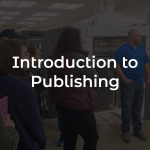An Interview with Phillip Barbb
Phillip Barbb is a TV producer, motivational speaker & coach, and published author. Barbb recently released his first title ‘All the Reasons I Hate My 28-Year-Old Boss,’ an entertaining, comedic, and motivational business and self-help book that tackles some of the most common frustrations, annoyances, and mental hang-ups of being a member of today’s youth-driven workforce.
We recently sat down to interview him about his journey as an author and what advice he can give other authors.
1. Tell us about your career and how it inspired you to write your first book.
I grew up in Metro-Detroit always loving entertainment and fantasizing about living out in California. Once I graduated from Michigan State University, I took the risk and moved out west. I had never been west of Wisconsin and had no idea what I was getting myself into. But I knew I needed to give it a shot or else I would always wonder “What If?”
I was able to land a job working on Undercover Boss as a Production Assistant and then slowly worked my way up to a producer. I’ve worked on shows for Netflix, YouTube Red, CBS, Fox, A&E, Facebook Watch, and many others.
I think all the years of creating video content gave me the confidence to begin writing my book. I never thought that a book was something I would create, but when you start creating one thing, you start to ask yourself, “What else can I create?”
I have always been a little bit obsessed with age. I would ask, “How much money does the average person have saved by age 30?” or “What is the average age of when people get married?” This obsession led to me wanting to write a book about ageism and how to help people overcome it.
2. What made you decide to use a publisher instead of self-publishing your book?
I was planning on self-publishing mainly out of fear of rejection. I didn’t want to reach out and have publisher after publisher tell me ‘no’ because I didn’t have a “platform” or large social media following. Meeting my publisher, Trusum Visions, was very serendipitous. As I started to become more and more vocal about writing a book, more people in my network started to ask how they could help. It was eventually family members that introduced me to team members at Trusum Visions and the rest is history.
The lesson here is don’t be afraid to put yourself out there. Whether or not you want to self-publish or seek the guidance of a publisher, if you believe that your content deserves an audience, then do everything in your power to give your book the best shot at reaching that audience. Will that mean facing some disappointment and rejection? 100%. Will it be worth it? 100%.
3. How long did it take you to write your book?
From the moment I decided to begin writing it until its release, the process was a little longer than 2 years. However, once I decided to pick a deadline and release date, the process accelerated. I highly recommend having a timeline, or else you might spend 7 years writing your first book that should have taken 7 months.
4. Were you able to establish your writing process? Did it change along the way?
When I began, it was setting aside time every week for writing. The ‘write when you are inspired’ approach. That was not efficient for me. It was slow-moving and I felt very stagnant and unmotivated with the lack of progress.
I began working with a Life Coach to help me get my coaching practice launched, and the topic of the book and its slow progress came up. After doing some thinking, I decided to set aside every Tuesday and Thursday morning from 6:00 am to 8:30 am to work on the book. It was the spark that lit the fire for me to finish the book.
5. What was the single hardest thing about writing your first book?
There are a million distractions to achieve anything in life. While the distractions got in the way, the hardest thing was dealing with the fear of not knowing what you are doing. So many of us, myself included, want things to be perfect and efficient and “the right way.” In doing something new, I was faced with the hard truth that I was in over my head and was in uncharted territory.
However, the very thing that made it hard is what makes the accomplishment at the end that much more fulfilling.
6. As a writer, what is the best investment you’ve made?
My editor, Chris Drabenstott. Hands down. Without her guidance and meticulous attention to detail, this book would have been filled with mistakes and I would have left a lot of readers scratching their heads thinking, “What did he mean by that?” I had many people read the first draft and they all gave me great but minimal feedback. You hear enough people tell you it’s “great”, or “entertaining”, or “fun”, and you start to think it is ready. And to the untrained eye, it was. But to someone like Chris, there was a lot of necessary work that needed to be done. HIRE AN EDITOR!
7. Looking back, what did you find was a big misconception about the publishing industry?
I will use an analogy. As a TV Producer in Los Angeles, I see a lot of aspiring actors and musicians move to Hollywood and think the first step is to get an agent and manager. However, a manager is only necessary once they have a career to manage. Actors and musicians think that the agent and manager are going to do all the work for them. NOT TRUE. The same goes for publishers.
Unless you are an established author with lots and lots of people already following you, a publisher isn’t going to prioritize your project. Building a timetable, marketing strategy, outreach, etc… the publisher is there to bounce ideas off of, but the heavy lifting will still fall on the author.
My editor and publishing team were able to connect me with Color House Graphics, but I was still the one that placed the order, followed up, and then drove out to the warehouse a day before my launch party to make sure everything was in order. My publisher and editor were extremely important to the process; however, there was a lot of work that needed to be done by me. If you are looking for someone to do everything for you, be ready to pay for it. In TV we always joke about the ‘Production Triangle’ which is “TIME, MONEY, and QUALITY.” You only can have two out of the three at any one time. So, if you want it done quickly and at a high quality, you better be ready to swipe that credit card.

8. If you could give one piece of advice to aspiring authors, what would it be?
Stop aspiring and just do it. Write the first draft as fast as possible. There will never be a perfect moment to start. Just get moving!
Also, when you are stuck, read. I don’t think I would have been able to write an entire book unless I had first read a lot of other people’s work.
9. Do you plan on writing another book soon?
Definitely … NOT. Lol. There is a lot of promotional work to still work on for “All The Reasons I Hate My 28-Year-Old Boss.” So I have a lot of work to do. But I will never say never.
10. Now that you are a published author, what advice would you give your younger self?
“You CANNOT connect the dots looking forward.” – Steve Jobs.
As much as I would have loved to say I knew every step I was going to make, planned it perfectly, and then executed with sheer will and desire… NOPE. You just keep taking the next step, make the next decision, and keep moving no matter what. I am all for having a vision, and planning, and making a strategy… but sometimes you just need to get moving and see where you end up.
11. So far, what’s been the most effective marketing strategy that has helped you sell more books?
When I figure it out, I will let you know. Haha. As a TV Producer, my job is to create compelling content, deliver it to Netflix or Fox or another network, and they make sure eyeballs see it. This is my first time having to own the marketing of my work, and to be honest, there is a steep learning curve. For a nonfiction author, I think podcasting is important because people are buying you as much as your ideas and knowledge. Social media. Throwing a big launch event. Asking for favors.
Whatever you decide, always think, “How do I make this easy for the person to buy?” So have your books with you, Amazon link ready, be prepared with your elevator pitch. Make sure you can quickly and clearly explain your book. If you need help, reach out to me at [email protected] and let me help. Or if that feels too sales-y, lol, read “The 3-Minute Rule” by Brant Pinvidic.
12. What has been the most exciting part of your journey as a writer?
The fact that I had no idea this would ever be a thing. I didn’t grow up writing or thinking about writing or dreaming about being a writer. It all happened very organically. I started writing motivational text messages to my friends and family, then they encouraged me to put them on social media. The people on social media said, “You need a blog.” So I started writing the blog, and then came the book idea. If you told me 2.5 years ago I would have a book out, I would tell you I have way too much else going on, that I was too busy, and no way in heck that is happening! Haha. Life is full of beautiful surprises.
13. Any last words of advice?
Shame on you.
Yes, Shame on you. Shame on you for withholding your gifts from the world. If you have words in you, and you think those words will resonate, entertain, help, serve other people, and you don’t write your book out of fear of failure, or lack of knowledge, or whatever other excuses we give ourselves as creatives…SHAME ON YOU.
Go and create. None of us make it out of life alive…so why not do something cool with your time. Now stop reading my words and go create your own!!! I love you all. – Phillip.
+++






